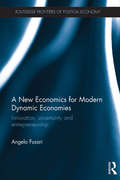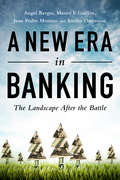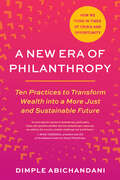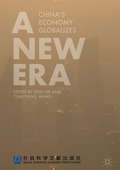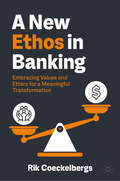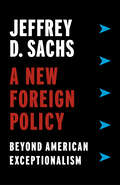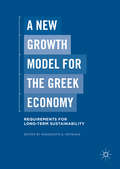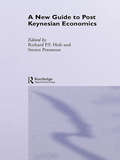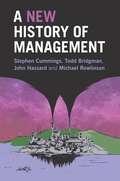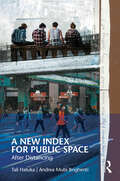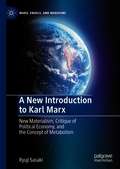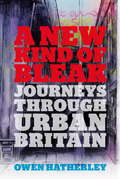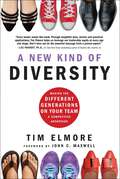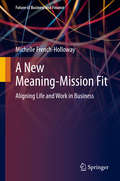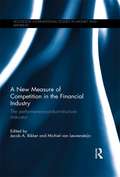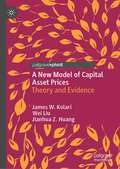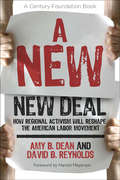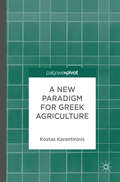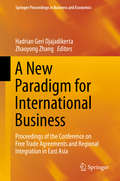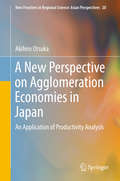- Table View
- List View
A New Economics for Modern Dynamic Economies: Innovation, uncertainty and entrepreneurship (Routledge Frontiers of Political Economy)
by Angelo FusariIt is becoming increasingly clear that a new economics is required for investigating modern dynamic economies and the coming social world. Important features of those economies, such as innovation, uncertainty and entrepreneurship, are usually considered capitalist features. This may have been true historically, but this book argues that the contrary will be true for the future: the full and efficient operation of those supposed capitalist features will increasingly require the overcoming of capitalist civilization. In this book, Angelo Fusari constructs a theoretical framework for the interpretation and management of modern dynamic economies which demonstrates that institutional transformations are essential if we are to move beyond the current consumer-capitalist age and the age of the domination of financial capital. A New Economics for Modern Dynamic Economies opens with a consideration of the basic aspects of modern dynamic economies and proceeds to develop a representation of the whole economic system centred on the interrelationships between entrepreneurship, innovation and radical uncertainty in a ‘dynamic competition’ process. This model provides an explanation of business cycles that largely differs from current explanations as it derives from the notion of dynamic competition. The book is then extended from the sectoral to the micro level and then to the level of the firm. The second half of the book is concerned with operational problems and in particular with the integration of this analysis of cycles with the notion of historical phases of development. The final chapter explores the route of the transition from capitalism to a new economic and social order – a transition of vital importance, both for the contemporary world and for the coming world. This volume is of great interest to those who study political economy, macroeconomics and economic theory and philosophy. The book shows the possibility of a scientific explanation of important ethical principles as indispensable to the organizational efficiency of the social system: for instance, the necessity and the way to conciliate productive efficiency, social justice and individual freedom.
A New England Girlhood, Outlined from Memory (Beverly, MA)
by Lucy LarcomArriving in Lowell, Massachusetts, in the 1830s after the death of her shipmaster father, the eleven-year-old Lucy Larcom went to work in a textile mill to help her family make ends meet. <P> <P> Originally published in 1889, her autobiography offers glimpses of the early years of the American factory system as well as of the social influences on her development. It remains an important and illuminating document of the Industrial Revolution and nineteenth-century cultural history.
A New Era in Banking: The Landscape After the Battle
by Mauro F. Guillén Emilio Ontiveros Angel Berges Juan P. MorenoThe financial crisis that began in 2007 triggered a break with banking practices of the past. Even as the crisis occurred, a broader set of economic, geopolitical, and technological forces were already reshaping the financial industry's transition from the twentieth to the twenty-first century. While these changes in the financial and global climate have led to a major overhaul of banking regulations and increased scrutiny of banks, they have also revealed opportunities for the development of a banking sector fit for the future. A New Era in Banking: The Landscape After the Battle identifies the main drivers of change at the heart of this wholesale transformation of the financial services industry. It examines the complex challenge for financial institutions to de-risk business models, reconnect with customers, and approach stakeholder value creation. Untangling the severe mutations that have taken place in the banking sector, A New Era in Banking, contextualizes these changes within larger trends that extend beyond the confines of the financial crisis. Banks are more vulnerable than ever to the crosscurrents of economic, demographic, regulatory, and technological change. However, by discussing how banks can operate as flexible, technology-enabled information businesses, A New Era in Banking advocates financial practices based not only on survival, but innovation.
A New Era in U.S. Health Care: Critical Next Steps Under the Affordable Care Act
by Stephen M. DavidsonA New Era in U.S. Health Care demystifies the Affordable Care Act for unfamiliar readers, setting an agenda for lawmakers and the health industry alike. It focuses on four key issues that will determine the success of this 2010 legislation: the use of state-run Medicaid programs to expand access to insurance; the implementation process; the creation of health insurance exchanges; and the introduction of a new organizational form, accountable care organizations.
A New Era of Philanthropy: Ten Practices to Transform Wealth into a More Just and Sustainable Future-- How we fund in times of crisis and opportunity
by Dimple Abichandani&“A must-read for anyone in philanthropy, particularly those who question whether and how philanthropic resources can address the current, complex challenges our world faces.&” —Nick Tedesco, president and chief executive officer of the National Center for Family Philanthropy A blueprint for how wealth can be transformed into a more just and sustainable future in times of rapid change and crisis.On the cusp of the greatest wealth transfer in history—with $84 trillion dollars moving between generations in the next 20 years—this book explores how philanthropy can be transformative, and transformed.Can philanthropy be an anti-racist, feminist, relational, and joyful expression of solidarity?This book argues that it not only can be—for the future we seek, and for philanthropy to achieve its greatest impact, it must be.Nationally recognized philanthropic leader Dimple Abichandani revolutionizes the precepts of modern philanthropy. Offering 10 provocative practice shifts, A New Era of Philanthropy engages readers with fresh answers to the question of how philanthropy can meet this high-stakes moment—from reimagining governance to aligning investments to crisis funding and beyond.Abichandani highlights paradigm shifts that model the way forward, moving beyond critique into real transformation, with relatable stories about funders who are forging a new era of philanthropy.A New Era of Philanthropy picks up where key books like Decolonizing Wealth and Winners Take All leave off, offering a guide for donors, foundations, and non-profit leaders navigating philanthropy in urgent times. Clear-eyed, hopeful, and responsive to the moment, this book helps us reimagine the purpose and norms of modern philanthropy. It is an invitation to all of us who believe these resources can contribute to a more just future: start here.
A New Era: China's Economy Globalizes
by Dexu He Chaoyang WangThis book collects the work of leading Chinese economists, sociologists, and political scientists as China enters a pivotal phase of development, as well as a new five-year plan. Scholars from China's leading institutions and think-tanks explore global economic trade patterns, regional imbalances, environmental pollution, rural-urban disputes, and much more. This book will be of interest to scholars, economists, and think-tank researchers.
A New Ethos in Banking: Embracing Values and Ethics for a Meaningful Transformation
by Rik CoeckelbergsThe financial services industry has one constant lately - change. What are the lessons of the past 25 years, and what can be done better in the future, especially when it comes to digital transformation and sustainability? This book investigates how change is impacting banking and the industry’s reputation, exploring what a new ethos in banking should look like, and, more importantly, the needed contributions from the industry to the road ahead. Based on interviews with industry leaders and the author's own personal experience, this book guides decision-makers in a new direction, a positive alternative to the status quo. The book is an urgent call to action, with practical and relevant insights to improve a bank’s societal footprint beyond the required compliance and regulatory efforts into sustainability, transparency, and ethics in banking. It will inspire those that look for successful stakeholder models without ignoring shareholder interests, putting people and society first, and understanding this can only work with a healthy financial model.
A New Financial Policy at Swedish Match
by Michael Norris Bo BeckerSwedish Match is a profitable smokeless tobacco company with low debt compared to other firms in its industry. The firms CFO now wants to revise the firms conservative financial policy.
A New Foreign Policy: Beyond American Exceptionalism
by Jeffrey D. SachsThe American Century began in 1941 and ended on January 20, 2017. While the United States remains a military giant and is still an economic powerhouse, it no longer dominates the world economy or geopolitics as it once did. The current turn toward nationalism and “America first” unilateralism in foreign policy will not make America great. Instead, it represents the abdication of our responsibilities in the face of severe environmental threats, political upheaval, mass migration, and other global challenges.In this incisive and forceful book, Jeffrey D. Sachs provides the blueprint for a new foreign policy that embraces global cooperation, international law, and aspirations for worldwide prosperity—not nationalism and gauzy dreams of past glory. He argues that America’s approach to the world must shift from military might and wars of choice to a commitment to shared objectives of sustainable development. Our pursuit of primacy has embroiled us in unwise and unwinnable wars, and it is time to shift from making war to making peace and time to embrace the opportunities that international cooperation offers. A New Foreign Policy explores both the danger of the “America first” mindset and the possibilities for a new way forward, proposing timely and achievable plans to foster global economic growth, reconfigure the United Nations for the twenty-first century, and build a multipolar world that is prosperous, peaceful, fair, and resilient.
A New Framework to Estimate the Risk-Neutral Probability Density Functions Embedded in Options Prices
by Kevin C. ChengA report from the International Monetary Fund.
A New Growth Model for the Greek Economy: Requirements for Long-Term Sustainability
by Panagiotis E. PetrakisOn June 3, 2015, the Greek Parliamentary Budget Office, the National and Kapodistrian University of Athens, the Democritus University of Thrace, and the University of Peloponnese sponsored an international conference to address medium- and long-term growth in Greece. This collection presents the strongest papers on the conditions required to revive and maintain economic growth. Leading experts cover almost every major issue identified in the latest literature, from demographic issues and proposals for export strategy to the need for innovation and structural reform. The combination of qualitative and quantitative approaches to assessing present conditions make this ground-breaking collection a valuable resource for a variety of academics, professional economists, and economic policy practitioners planting the seeds of Greece's future.
A New Guide to Post-Keynesian Economics (Routledge Studies In Contemporary Political Economy Ser.)
by Steven Pressman Richard P. HoltEichner's classic A Guide to Post-Keynesian Economics (1978) is still seen as the definitive staging post for those wishing to familiarise themselves with the Post-Keynesian School. This book brings the story up-to-date.Of all the subgroups within heterodox economics, Post-Keynesianism has provided the most convincing alternative to mainstream theo
A New History of Management
by John Hassard Michael Rowlinson Stephen Cummings Todd BridgmanExisting narratives about how we should organize are built upon, and reinforce, a concept of 'good management' derived from what is assumed to be a fundamental need to increase efficiency. But this assumption is based on a presentist, monocultural, and generally limited view of management's past. A New History of Management disputes these foundations. By reassessing conventional perspectives on past management theories and providing a new critical outline of present-day management, it highlights alternative conceptions of 'good management' focused on ethical aims, sustainability, and alternative views of good practice. From this new historical perspective, existing assumptions can be countered and simplistic views disputed, offering a platform from which graduate students, researchers and reflective practitioners can develop alternative approaches for managing and organizing in the twenty-first century.
A New Index for Public Space: After Distancing
by Tali Hatuka Andrea Mubi BrighentiA New Index for Public Space: After Distancing offers readers a re-evaluation of the notion of publicness as a lens to unpack the complexity of urban space. A "new index" is proposed to reconstitute the promises and the predicaments of public space to better prepare for the contemporary challenges of post-pandemic, conflict-ridden society. Part I provides a theoretical introduction to the idea of public space and publicness, laying out the book’s rationale; Part II offers a new index of terms, including affects, alignments, atmosphere, conviviality, diagrams, documenting, flow, and more; and Part III applies the proposed lexicon with a "random walk" approach, inviting the reader to use the lens of nonlinear evolutionary dynamics as a means for envisioning the future of publicness. This book is the outcome of a conversation across disciplines – specifically, urban design and social theory – revolving around the recognition that public space is inherently fragile, messy, conflicted, and evolving. This book will be of interest to urban planners, architects, and urban designers, as well as human geographers, sociologists, political theorists, and those working in community development.
A New Introduction to Karl Marx: New Materialism, Critique of Political Economy, and the Concept of Metabolism (Marx, Engels, and Marxisms)
by Ryuji SasakiThis book provides a concise overview of Marx’s philosophy and political economy, tracing various changes of his theoretical views over time through his practical and theoretical engagements with contradictions of capitalism from the unique perspective of Japanese Marxism. While it offers an objective introduction to Marx’s critique of capitalism, Sasaki uniquely pays particular attention to the concept of “metabolism,” whose disruption under the capitalist mode of production causes exhaustion of labour-power as well as natural resources. Sasaki reconstructs Marx as a revolutionary thinker, whose devoted his entire life for the sake of establishing a more free and equal society beyond capitalism. Sasaki’s book shows that Marx’s passion for the socialist revolution in his last years is recorded in his late excerpt notebooks that become available through the Marx-Engels-Gesamtausgabe.
A New Keynesian Model of the Armenian Economy
by Era Dabla-Norris Ara Stepanyan Ashot MkrtchyanA report from the International Monetary Fund.
A New Kind of Bleak
by Owen HatherleyIn A Guide to the New Ruins of Great Britain, Owen Hatherley skewered New Labour's architectural legacy in all its witless swagger. Now, in the year of the Diamond Jubilee and the London Olympics, he sets out to describe what the Coalition's altogether different approach to economic mismanagement and civic irresponsibility is doing to the places where the British live.In a journey that begins and ends in the capital, Hatherley takes us from Plymouth and Brighton to Belfast and Aberdeen, by way of the eerie urbanism of the Welsh valleys and the much-mocked splendour of modernist Coventry. Everywhere outside the unreal Southeast, the building has stopped in towns and cities, which languish as they wait for the next bout of self-defeating austerity.Hatherley writes with unrivalled aggression about the disarray of modern Britain, and yet this remains a book about possibilities remembered, about unlikely successes in the midst of seemingly inexorable failure. For as well as trash, ancient and modern, Hatherley finds signs of the hopeful country Britain once was and hints of what it might become.
A New Kind of Diversity: Making the Different Generations on Your Team a Competitive Advantage
by Tim ElmoreIn A New Kind of Diversity, bestselling author Tim Elmore brings his decades of research and leadership experience to bear on what might be the biggest, most dramatic, and most disruptive shift the American workforce has ever seen: the vast diversity of several generations living—and working—together. The past few years have brought an endless cascade of social media movements that left many of us . . . well . . . scratching our heads. #Occupy Wallstreet. #March For Our Lives. #Black Lives Matter. #MeToo. #ClimateChange. Regardless of how you might feel about these protests, each symbolizes a gap. Despite the perspectives on all sides of these causes, a clear issue remains: There is a huge gap in this country that few are taking seriously. While diversity is usually seen as an ethnic, gender, or income issue—there is a new kind of diversity that only eight percent of U.S. companies even recognize: diverse generations on teams. Long laughed off as a cliché and more recently mocked in memes #HowToConfuseMillennials and #OKBoomer hashtags, the generational gap has become an undeniable tension in the global workplace. Sadly, it has fostered: Loneliness in our workplaces. Poor communication on our teams. Reduction in revenue and team morale. Conflicting values and priorities in the office. Divisions that lead to &“walls&” instead of &“bridges.&” For the first time in history, up to five generations find themselves working alongside each other in a typical company. The result? There can be division. Interactions between people from different generations can resemble a cross-cultural relationship. Both usually possess different values and customs. At times, each generation is literally speaking a different language! How can we hope to work together when we can&’t even understand each other? This book provides the tools to: Get the most out of the strengths of each age group on your team. Foster effective communication instead of isolation among people. Build bridges rather than walls so that loneliness becomes connectedness. Connect people to learn how both veterans and rookies can mentor each other.
A New Meaning-Mission Fit: Aligning Life and Work in Business (Future of Business and Finance)
by Michelle French-HollowayThis book offers a clear process for managers, professionals, and future leaders to help discover their personal meaning in life and apply it to their work. The author uses research outcomes and theories to refute the contemporary philosophy that stresses following an individual’s passion alone when choosing a particular job or career. Instead, she recommends employing a personal meaning-oriented approach to life and work, and then becoming passionate about one’s work organically.The book also highlights the positive outcomes to organizations and societies when individuals engage with finding meaning in work, focusing on physical and emotional health and satisfaction. The author provides numerous examples of leaders who have aligned their personal meaning and organizational mission, also known as “meaning-mission fit,” and the relationship of this alignment to their emotional well-being. Together, the research, theory, and evidence in this book equip leaders and managers with an inspiring model to find their own meaning-mission fit, as well as create opportunities for the employees to do the same.
A New Measure of Competition in the Financial Industry: The Performance-Conduct-Structure Indicator (Routledge International Studies in Money and Banking)
by Jacob A. Bikker Michiel Van LeuvensteijnThe 2008 credit crisis started with the failure of one large bank: Lehman Brothers. Since then the focus of both politicians and regulators has been on stabilising the economy and preventing future financial instability. At this juncture, we are at the last stage of future-proofing the financial sector by raising capital requirements and tightening financial regulation. Now the policy agenda needs to concentrate on transforming the banking sector into an engine for growth. Reviving competition in the banking sector after the state interventions of the past years is a key step in this process. This book introduces and explains a relatively new concept in competition measurement: the performance-conduct-structure (PCS) indicator. The key idea behind this measure is that a firm’s efficiency is more highly rewarded in terms of market share and profit, the stronger competitive pressure is. The book begins by explaining the financial market’s fundamental obstacles to competition presenting a brief survey of the complex relationship between financial stability and competition. The theoretical contributions of Hay and Liu and Boone provide the theoretical underpinning for the PCS indicator, while its application to banking and insurance illustrates its empirical qualities. Finally, this book presents a systematic comparison between the results of this approach and (all) existing methods as applied to 46 countries, over the same sample period. This book presents a comprehensive overview of the knowns and unknowns of financial sector competition for commercial and central bankers, policy-makers, supervisors and academics alike.
A New Model of Capital Asset Prices: Theory and Evidence
by James W. Kolari Wei Liu Jianhua Z. HuangThis book proposes a new capital asset pricing model dubbed the ZCAPM that outperforms other popular models in empirical tests using US stock returns. The ZCAPM is derived from Fischer Black’s well-known zero-beta CAPM, itself a more general form of the famous capital asset pricing model (CAPM) by 1990 Nobel Laureate William Sharpe and others. It is widely accepted that the CAPM has failed in its theoretical relation between market beta risk and average stock returns, as numerous studies have shown that it does not work in the real world with empirical stock return data. The upshot of the CAPM’s failure is that many new factors have been proposed by researchers. However, the number of factors proposed by authors has steadily increased into the hundreds over the past three decades. This new ZCAPM is a path-breaking asset pricing model that is shown to outperform popular models currently in practice in finance across different test assets and time periods. Since asset pricing is central to the field of finance, it can be broadly employed across many areas, including investment analysis, cost of equity analyses, valuation, corporate decision making, pension portfolio management, etc. The ZCAPM represents a revolution in finance that proves the CAPM as conceived by Sharpe and others is alive and well in a new form, and will certainly be of interest to academics, researchers, students, and professionals of finance, investing, and economics.
A New New Deal: How Regional Activism Will Reshape the American Labor Movement (A Century Foundation Book)
by Amy B. Dean David B. ReynoldsA Century Foundation BookIn A New New Deal, the labor movement leaders Amy B. Dean and David B. Reynolds offer a bold new plan to revitalize American labor activism and build a sense of common purpose between labor and community organizations. Dean and Reynolds demonstrate how alliances organized at the regional level are the most effective tool to build a voice for working people in the workplace, community, and halls of government. The authors draw on their own successes to offer in-depth, contemporary case studies of effective labor-community coalitions. They also outline a concrete strategy for building power at the regional level. This pioneering model presents the regional building blocks for national change. A diverse audience—both within the labor movement and among its allies—will welcome this clear, detailed, and inspiring presentation of regional power-building tactics, which include deep coalition-building, leadership development, policy research, and aggressive political action.A New New Deal explores successful coalitions forged in Los Angeles, Boston, Denver, San Jose, New Haven, and Atlanta toward goals such as universal health insurance for children and sensible redevelopment efforts that benefit workers as well as businesses. The authors view partnerships between labor and grassroots organizations as a mutually beneficial strategy based on shared goals, resulting in a broadened membership base and increased organizational capacity. They make the innovative argument that the labor movement can steward both industry and community and make manifest the ways in which workplace battles are not the parochial concerns of isolated workers, but a fundamental struggle for America's future. Drawing on historical parallels, the authors illustrate how long-term collaborations between labor and community organizations are sowing the seeds of a new New Deal.
A New Paradigm for Greek Agriculture
by Kostas KarantininisThis book offers an assessment of new opportunities available for the agricultural sector and provides technical assistance to the Greek authorities with regards to its rural development and fishery sector. Karantininis follows a value chain approach and analyzes the Greek agri-food industry, breaking it down vertically and horizontally. Vertically, the Greek agri-food chain is stripped to its main upstream and downstream components: inputs, primary production, distribution and retail. Horizontally, the agri-food value chain is analyzed in terms of size, ownership, governance and space. The author pays special attention to policy formation, policy implementation, the political and industrial structure, land and credit markets, education, extension and research. The author focuses on this through three subcategories of fruits and vegetables, aquaculture and olive oil. A number of opinions and recommendations are presented in each section, concluding with propositions for a new institutional structure for Greek agriculture.
A New Paradigm for International Business: Proceedings of the Conference on Free Trade Agreements and Regional Integration in East Asia (Springer Proceedings in Business and Economics)
by Hadrian Geri Djajadikerta Zhaoyong ZhangThis book offers a collection of studies on regional integration and the dynamic business environment in East Asia. The papers included, originally presented at the 2014 Asia Pacific Business Conference on "Free Trade Agreements and Regional Integration in East Asia," examine the challenges and dynamics in the increasingly integrated East Asian markets and outline a new paradigm for doing international business in the region. The papers address diverse areas related to regional integration, financial markets, investment, trade and capital flow, sustainability, accounting and auditing issues, exchange rates, strategies and the regional business environment. The book provides a valuable resource for practitioners, policy-makers and students who are interested in understanding the vibrant aspects of business in today's East Asia.
A New Perspective on Agglomeration Economies in Japan: An Application of Productivity Analysis (New Frontiers in Regional Science: Asian Perspectives #20)
by Akihiro OtsukaThis book describes various methods of analysis for ascertaining the effects of agglomeration economies, which are important for formulating regional economic policies. Specifically, it describes new analytical approaches using productivity and productive efficiency analyses as methods for understanding agglomeration economies. Additionally, the book provides application results for Japanese regions and proposes desirable regional policies. According to the new analytical methods advocated in this book, agglomeration economies are larger in major metropolitan areas than in local regions, and in the manufacturing sector than in the non-manufacturing sector. These results are consistent with general knowledge. Moreover, the majority of productivity growth pertaining to regional economies is explainable by improvements to accessibility. Improving accessibility for regions reduces transportation costs between them and strengthens agglomeration economies, which, in turn, enable the sustainable development of regional economies. Therefore, this book highlights the need not only to reinforce existing agglomeration areas, but also to form a network between these agglomerations and to strengthen it, so as to realize regional economic growth despite a decreasing population.
